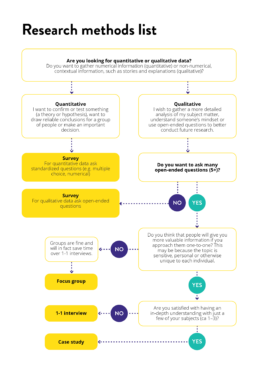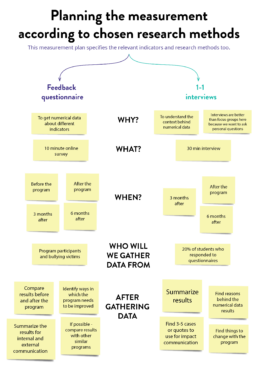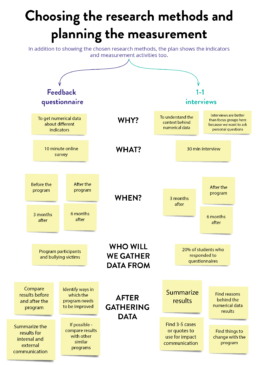Research methods list
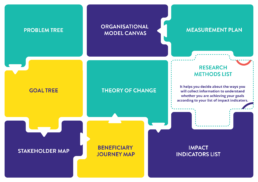
A list of research methods helps you decide about the ways you will collect information to understand whether you are achieving your goals according to your list of impact indicators.
What is it?
The research methods list consists of – as its name says – several research methods that you can use to collect information about the impact of your organisation.
On the one hand, you can use this list after you’ve chosen your impact indicators. Alternatively, you can first do some research to understand better which indicators to choose and only then decide what will be the appropriate methods to collect information according to these indicators.
In more detail…
1.Choose one or multiple research methods to evaluate your project’s impact from the list by following the questions on the diagram.
2.Follow the instructions and the checklist about each of the methods to evaluate impact effectively.
If you need additional information on any of the methods, we encourage you to look it up online! Each of the methods has its own peculiarities that you need to know about, for example, conducting a focus group needs a very skilled moderator.
You can also have variations in its use
Start from the basics (by doing at least some interviews or a basic survey).
If more resources are available, moving to more advanced options (e.g. planning focus groups or designing a through survey according to the questions that are recommended by the experts).
Learn more how to use these tools to manage and measure your impact
Individual interviews
They are a perfect method at any stage of your activities. For example, you can talk to young people to gather information:
- about their needs and challenges (to create the problem tree),
- on how they have participated in your activities and what their satisfaction has been (to create the beneficiary journey map),
- whether your activities have helped the youngsters to experience any positive changes in their lives (to understand your impact).
What is important to remember: the interviews always represent a viewpoint of only one individual. Maybe many others had completely different experiences. While it is possible to learn greatly from one single interview, you should never make any claims about your impact based on just one person´s statements.
Focus groups
They are a perfect method in case you need such kind of information from the people that can be obtained more easily when there is a discussion and experience exchange going on.
For example, you have mapped the problems of your beneficiaries but you would also need more understanding of the root causes of the problems. In that case, a focus group would be an excellent format to discuss the causes with young people or experts. Likewise, you can invite a group of your beneficiaries to discuss the effects that participation in your organisation´s activities has had on them.
What is important to remember: the focus groups need to be handled by a very good moderator who can firmly and politely steer the discussion and avoid any conflicts between the group members. Also, the participants may not be willing to talk about any details of their personal life. To ask about more personal issues, an individual interview is a much more suitable method.
Case studies
They are a perfect method in case you need to deeply understand the experiences of one individual or a group of individuals or an event that has taken place.
Creating a case study usually requires collecting information from a variety of sources, including electronic files, interviews or even going to a physical site and making observations. The main advantage of a case study is being able to deeply understand and/or communicate one typical or extraordinary aspect of your work. The case studies can be made of “good” as well as “bad” examples.
What is important to remember: when communicating a case study, it is always important to tell whether it represented a typical example of your impact or not. Maybe you had just one successful case and everything else failed. If so, be honest about it.
Surveys
They are a perfect method in case you need to collect information from a larger number of individuals that you would be able to interview or invite to participate in focus groups. A survey is an especially useful method if you are planning to ask so-called closed questions (e.g. answering yes/no or indicating a number on a scale from 1 to 10).
What is important to remember: any survey needs to be tested first to be sure that the respondents understand the questions the same way that you hoped they would. Also, usually, the surveys give only a limited answer to the question “Why?” as the short answers lack any information about the deeper reasons. To collect more information, you can organise individual interviews or focus groups.
Here is an example about a cyberbullying prevention program.
Why to use it?
☑ To collect data to understand your impact.
☑ To find ways to measure your project’s impact. The tool also provides suggestions on how to make effective choices with limited resources.
When to use it?
☑ After you have decided which indicators you would like to use to measure your impact.
☑ Before you start collecting information about your impact.


